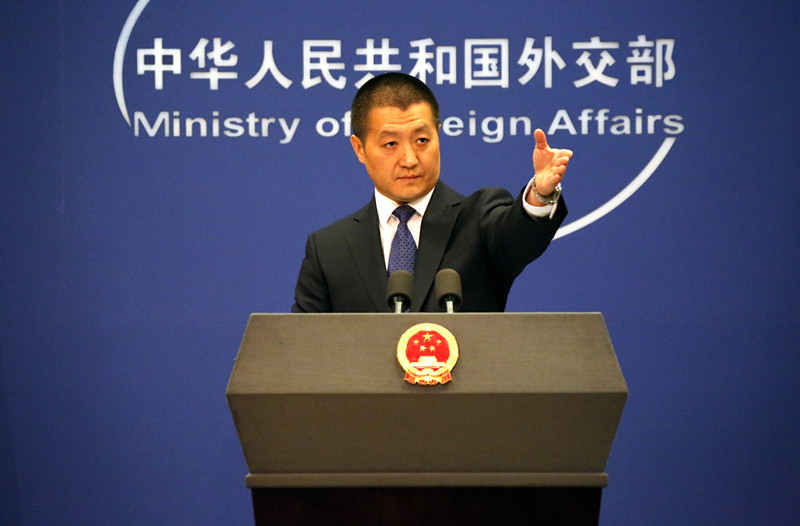
- The Wall Street Journal reports: "China reacted angrily to a bill in the U.S. Senate that would allow U.S. Navy vessels to make regular stops in Taiwan ports. The proposed change, after decades of a "One China" policy that requires the U.S. to forgo official recognition of Taipei, was approved by the Senate Armed Services Committee as part of larger measure. Beijing, which considers Taiwan a breakaway province, quickly called on the U.S. to abide by the One China policy, which it sees as an issue of unrivaled importance. "We express our grave concern on this Taiwan-related bill," said Foreign Ministry spokesman Lu Kang in a regular news briefing on Thursday. "The Taiwan issue concerns China's sovereignty and territorial integrity. It is China's internal affairs." A spokesman for China's Defense Ministry echoed the sentiment. "We have always firmly opposed any form of official contacts and military interaction between the U.S. and Taiwan," Senior Col. Wu Qian told a regular news conference later Thursday, saying such contacts risk damaging China-U. S. relations and peace and stability across the Taiwan Strait. Taiwan's Ministry of Defense didn't respond to a request for comment."
The Financial Times reports: China's tech giants and media companies have bowed to government demands to limit online freedoms by closing down hundreds of mobile video platforms, firing thousands of journalists and promising to promote state media opinions. The capitulation is part of the continuing government crackdown on online content, which started earlier this month when regulators closed dozens of the country's most popular celebrity gossip accounts. Analysts say the move is a result of the government's desire to control public debate in the run-up to a big reshuffle of power in the ruling Communist party this autumn. The culture ministry announced on Thursday that it had enlisted the help of mobile app providers such as Tencent, Alibaba and Baidu to delete 291 mobile video platforms and had worked with media companies to terminate the contracts of almost 10,000 broadcast journalists and performers.
The Washington Post comments: "Let's imagine a Chinese 'applied history' project, similar to the one at Harvard's Belfer Center that helped spawn Professor Graham Allison's widely discussed book 'Destined for War.' Allison's historical analysis led him to posit a 'Thucydides Trap' and the danger (if not inevitability) of war between a rising China and a dominant America, like the ancient conflict between Athens and Sparta chronicled described by the Greek historian Thucydides. A study by the Belfer Center's Applied History Project identified 16 similar 'rising versus ruling' cases over the past 500 years, 12 of which resulted in war. What would the Chinese say about the lessons of past interactions with the West? Chinese analysts, from President Xi Jinping on down, have nominally rejected Allison's pessimistic analysis. 'There is no Thucydides Trap,' Xi has argued, claiming that he had devised an alternative 'new type of great-power relations" that would avoid war by recognizing that each Asian giant had its own legitimate interests. More recently, he has shifted to arguing that 'China and the U.S. must do everything possible to avoid [the] Thucydides Trap.'"
- 2017-06-28 Soybean Diplomacy: New U.S. Ambassador to China Touts Agricultural Trade
- 2017-06-27 China And The U.S. Are Cooling Their Cooperation To Curb North Korea
- 2017-06-27 China And The U.S. Are Cooling Their Cooperation To Curb North Korea
- 2017-06-26 New U.S. ambassador to China says North Korea a top priority
- 2017-06-25 There's No End in Sight for China's Rise Up the GDP Rankings
- 2017-06-23 Xi Jinping Is Set for a Big Gamble With China’s Carbon Trading Market
- 2017-06-22 Exclusive: South Korea president calls on China's Xi to do more on North Korea nuclear program
- 2017-06-21 China stocks hit 18-month high on MSCI inclusion
- 2017-06-20 China tour agency says won’t take more US tourists to NKorea
- 2017-06-19 China, Russia held navy drill on Sunday: Xinhua
- The Financial Times China's Weibo bows to Beijing censorship demands
- Reuters China says Pakistan military base talk pure speculation
- The Wall Street Journal China Tells U.S. Senate to Keep Its Nose Out of Taiwan
- The New York Times China Won't Let Liu Xiaobo, Nobel Laureate, Get Cancer Treated Abroad
- CNN With an eye on China, Trump weighs stepping up pressure on North Korea
- Foreign Policy Chinese Oil Giant Cuts Off Fuel Sales to North Korea
- The Washington Post China pledges continued assistance to Philippines
- Reuters China's Xi tells Hong Kong he seeks 'far-reaching future' for its autonomy
- Bloomberg China's Bonds Are Ready to Join Stocks on the World Stage
- Forbes Tesla Takes On China: Musk Plans His First Electric Car Plant In Asia
- Reuters China factory activity seen cooling in June, crackdown on debt risks drag
- The New York Times Hong Kong, 20 Years After the Handover
- The Financial Times China's high-frequency traders in retreat after court verdict
- The Washington Post Is war between a rising China and a dominant America inevitable? A thought experiment.
- The Wall Street Journal Don't Fight China, the Federal Reserve of Coal
- The Diplomat Is a New China-Vietnam Maritime Crisis Brewing in the South China Sea?
- Quartz China would prefer Hong Kong forget about another historic anniversary that falls this year
- Forbes Watch Out, China: India Is Building A 'New Silk Road' Of Its Own
- The Financial Times China tensions give Hong Kong an identity crisis
- Fortune What It's Like to Make Ivanka Trump Shoes: Long Hours, Low Pay and Abuse